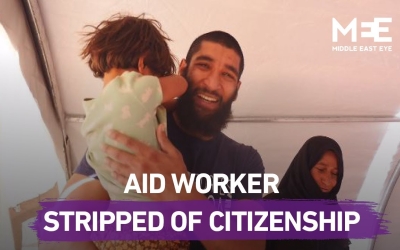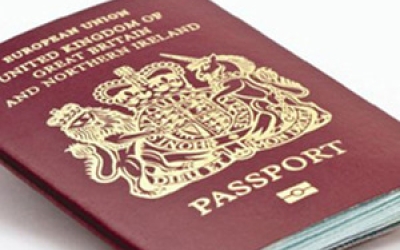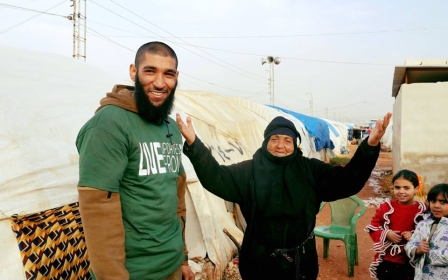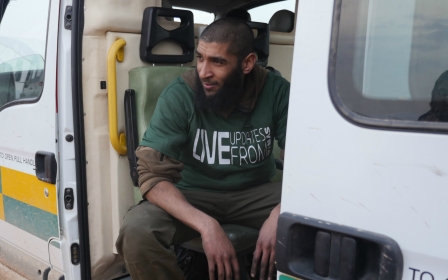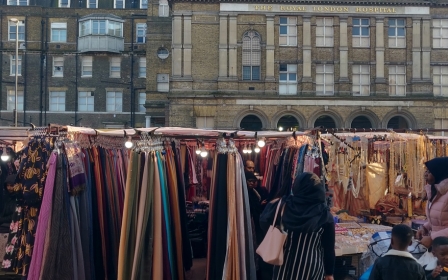'White Helmets' volunteers speak up for aid worker stripped of UK citizenship
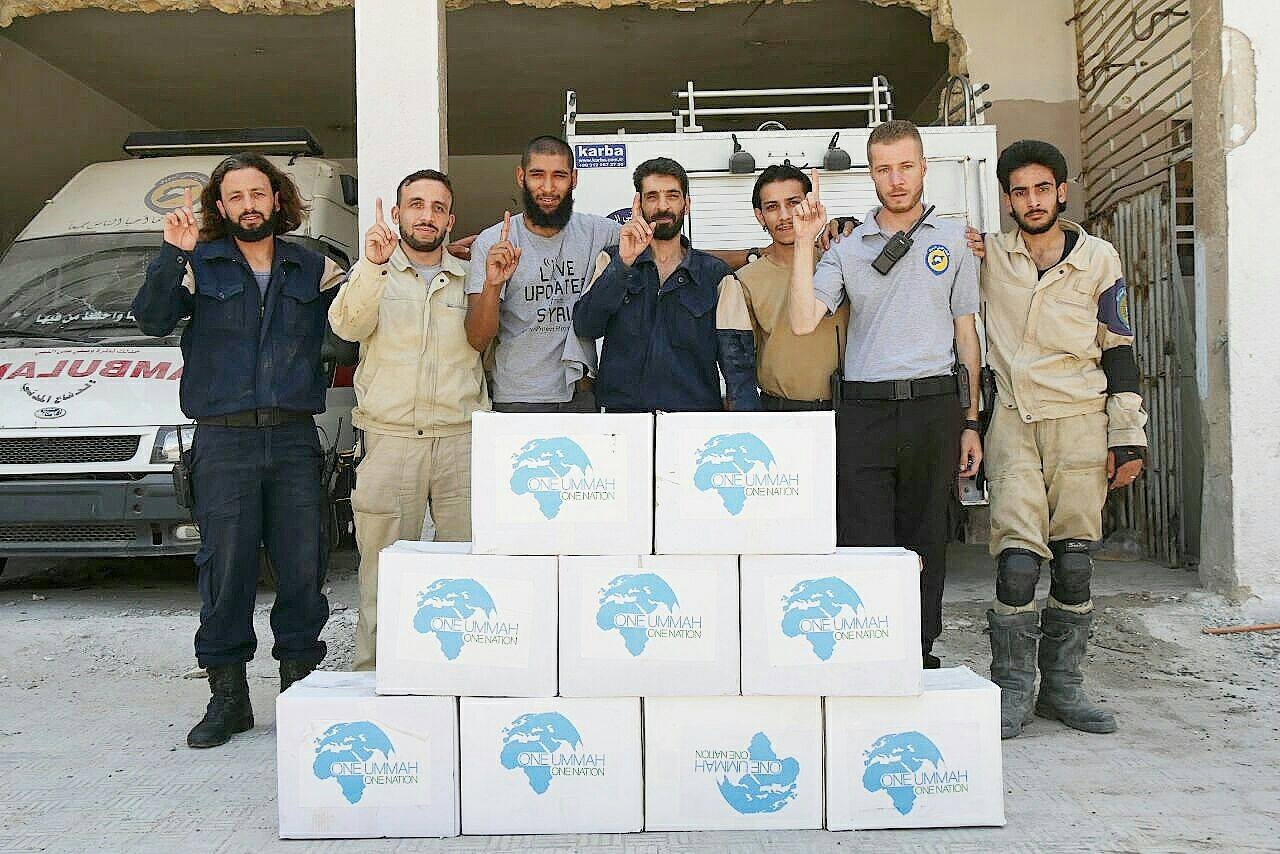
Volunteers in the Syria Civil Defence (SCD), commonly known as the White Helmets, in opposition-held northern Syria have told Middle East Eye that the British government's decision to revoke the citizenship of a well-known aid worker is senseless and an "injustice".
The SCD has formally distanced itself from Sharif since he revealed earlier this week that he had lost his citizenship. But several volunteers within the search-and-rescue organisation, which is part-funded by the British government, said they were dismayed and concerned to hear that Tauqir Sharif had been stripped of his citizenship.
Sharif, who is originally from London, has worked in Syria since 2012 and been based in Idlib province's Atmeh camp for people displaced by the country's war since 2o13. He has posted several photos online showing himself visiting SCD facilities and delivering aid to its volunteers.
Speaking to MEE over Whatsapp, one volunteer in the search-and-rescue organisation in northern Syria instantly recognised Sharif when shown a picture of the aid worker and said he had met him in rural Idlib.
"Who doesn't know him?" he said. "This man runs some of the most successful aid initiatives in the area, especially those that focus on helping widows and orphans: two groups that were left alone with no support," said Malik Yaseen, not his real name.
Yaseen was speaking to MEE in an individual capacity before the SCD issued its own statement about Sharif's case on Wednesday, and subsequently asked that his real name was not used because of the sensitivity of the issue.
"He has not worked with the SCD directly but has worked to help build camps, mosques and schools in the area," he said.
All of those who spoke to MEE did so in an individual capacity, rather than as official representatives of the SCD.
Sharif's aid organisation, Live Updates from Syria, currently manages scores of projects for Syrians displaced and affected by the country's ongoing conflict and employs 170 people, he told MEE earlier this week.
He has also delivered aid to frontline areas, and has driven ambulances and helped to pull injured people and bodies out of rubble following air strikes.
In 2015, Sharif was among local residents in Atmeh who worked to recover the bodies of six children and three members of a refugee family who were killed in an air strike by the US-led coalition.
In August 2016 he was photographed alongside White Helmet volunteers in eastern Aleppo, delivering boxes of food to one of the organisation's bases and posing in a white helmet in front of an SCD logo.
In posts accompanying the photo on Facebook, he said that he was "working along side the White Helmets" and described them as heroes.
Sharif revealed on Monday that he was one of a number of British nationals in Idlib to have been stripped of citizenship on the grounds, according to the government, that he is "aligned with an al-Qaeda-aligned group" and posed a "risk to the national security of the UK".
He is appealing against the decision and denies being aligned with any groups.
Commenting on the British government's action, Yaseen said: "Why would they do that?
"Instead of honouring his work and praising his outstanding support, they revoke his citizenship. I can't understand this injustice, because he is not a jihadist, he is an aid worker, and God bless him for that."
The SCD formally distanced itself from Sharif in statements in English and Arabic on Wednesday following posts on social media which incorrectly suggested he was associated with the White Helmets, and speculation that his case presented evidence of links between the organisation and al-Qaeda-linked groups.
The SCD said that Sharif had never been listed as a volunteer with the SCD, and that the organisation's regulations only permitted Syrian nationals to serve as volunteers.
The Arabic version of the statement said that social media posts linking Sharif to the organisation were part of a campaign "funded by parties supported by the Syrian regime and the Russian Federation... targeting the independence of the SCD and its operations".
The English version of the statement did not mention the Syrian government or Russia, saying instead that the social media posts were part of a campaign to "systematically spread disinformation" about the SCD.
'A good relationship'
Sharif told MEE that he had never claimed to have been part of the White Helmets, but that he had worked alongside them on a number of occasions.
"I've given them aid and I've helped their people. Obviously when you are in a disaster zone, everybody is in the same vicinity and there are only certain places where you are safe. We have a good relationship."
Mahamid Omar, another White Helmet volunteer in northern Syria, also said that he knew of Sharif's work, and that he had visited SCD centres across the Idlib region.
Like Yaseen, Omar was speaking to MEE in an individual capacity before the SCD published its statement and asked that his real name was not used because of the sensitivity of the issue.
"I haven't worked with him as our line of work is entirely different, but I see the contribution he brings whenever I come across him in the camp or elsewhere across Idlib," said Omar.
"His main area of activity is in Atmeh where thousands of civilians have fled to since 2013.
"Most of the people know him for hosting festivals for children, gifts he brings during Ramadan, and free food distribution for a large number of Syrians displaced by the fighting."
The UK and citizenship-stripping powers
+ Show - HideThe UK has been described by researchers as a “global leader in using citizenship deprivation as a counterterrorism measure”.
Historic citizenship-stripping powers targeted at naturalised citizens on disloyalty grounds had largely fallen into disuse prior to 2002, when the government introduced new measures in an attempt to revoke the citizenship of Abu Hamza, an Egyptian-born cleric subsequently convicted of terrorism in the US.
The 2002 legislation allowed for British-born nationals as well as naturalised citizens to lose their nationality rights. Successive governments gradually broadened the scope of the powers so that home secretaries can now deprive anyone of citizenship if they are satisfied that doing so is “conducive to the public good” and would not leave an individual stateless.
No criminal conviction is required. Letters often state that individuals have been assessed as presenting “a risk to the national security of the United Kingdom”.
The government’s use of the powers surged to unprecedented levels in response to the perceived threat posed by British nationals returning from Syria.
Between 2010 and 2015, 33 people were stripped of their citizenship, according to Home Office figures. In 2016, 14 people were deprived, and in 2017 the number jumped to 104.
In 2018, the figure was 21, and in in 2019 - when Shamima Begum was among those targeted - it was 27. It then dropped to ten in 2020 and eight in 2021.
Some subjects of citizenship-stripping orders argue that they have been left effectively stateless, because the government bases its assessment that they are dual nationals on a right of citizenship to a parent’s country of birth, even if they have never taken up that citizenship or even visited the country.
In some cases the Special Immigration Appeals Commission, which rules on citizenship cases, has agreed: it has ruled in favour of British nationals of Bangladeshi descent on the grounds that Bangladesh does not consider them citizens if they have not claimed Bangladeshi nationality before the age of 21.
Human rights organisations and lawyers have compared the powers to “medieval exile and banishment”. Critics also point out that the powers create a two-tier system in which only those deemed to be dual nationals are at risk of losing their British citizenship; a measure that discriminates against naturalised citizens, immigrants and their children.
Omar also said that he could not understand why the British government had revoked Sharif's citizenship.
"It makes no sense for the UK or any other country to equate aid workers who are truly devoted to helping the Syrian people to the likes of ISIS or al-Qaeda, who have devastated our country," he said.
"If you tell any of the residents in Atmeh that [Sharif's] citizenship has been revoked they would laugh. But it's not a funny joke, sadly. It has happened for real, and we feel for him."
The Syria Civil Defence is a volunteer search-and-rescue group that has operated in opposition-held areas since 2012.
During the course of the Syrian war, the group have been targeted by Russian and Syrian warplanes. Some members of the group have also been imprisoned and tortured by government forces.
At least 259 volunteers have been killed since the organisation was established, according to its own figures. It claims to have rescued 116,000 civilians from air strikes.
In 2018, a freedom of Information request revealed that the British government had provided approximately $50 million (£38m) to support the SCD. Other funders have included the governments of the US, Germany, Canada, Denmark and Japan.
Middle East Eye propose une couverture et une analyse indépendantes et incomparables du Moyen-Orient, de l’Afrique du Nord et d’autres régions du monde. Pour en savoir plus sur la reprise de ce contenu et les frais qui s’appliquent, veuillez remplir ce formulaire [en anglais]. Pour en savoir plus sur MEE, cliquez ici [en anglais].


